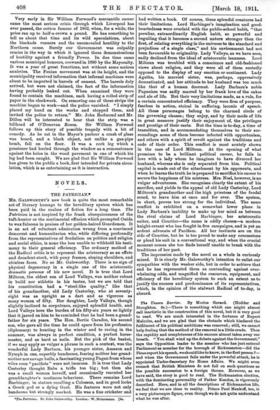A LIVERPOOL MERCHANT.t
THOUGH Sir William Forwood had the good fortune, for which he does not seem to be altogether thankful, to be able to retire from business twenty years ago, he has much to tell us about modern Liverpool. He has had a great share in the activities which have so greatly changed the place, making it in its out- ward aspect and in its government worthy of its promotion from the rank of town to that of city. The visible sign of this promotion, the Cathedral, was largely his work. The first Bishop (Dr. Ryle) was distinctly indifferent, and the attempt to raise a Cathedral Fund was a total failure. His successor took a broader view, and Sir William Forwood, not without some reluctance, undertook for the second time the office of treasurer. In 1887 the subscriptions came to a total of £41,000; but in 1904, when King Edward VII. laid the first stone, they amounted to £325,000.
'Oxford Studies in the Synoptic Problem. Edited by W. Sanday, D.D. Ox- ford at the Clarendon Press. [128. 6d. net.) t Recollections of a Busy Life. By Sir William Forwood. Liverpool : Henry Young and Sons. [6s. net.]
Very early in Sir William Forwood's mercantile career came the most serious crisis through which Liverpool has ever passed, the cotton famine of 1862, when, for a while, the price ran up to half-a-crown a pound. He has something to tell us about that time and its wild speculations, about the blockade runners and the unconcealed hostility to the Northern cause. Surely our Government was culpably remiss in the way in which it ignored these demonstrations of hostility against a friendly Power. In due time came various municipal honours, crowned in 1880 by the Mayoralty. It was a year of great functions, not without some serious anxieties. The Fenian movement was at its height, and the municipality received information that infernal machines were about to be imported in barrels of cement. The barrels duly arrived, but were not claimed, the fact of the information having probably leaked out. When examined they were found to contain the machines, each having a rolled strip of paper in the clockwork. On removing one of these strips the machine began to work—and the police vanished. " I simply placed my band on the works and stopped them, and invited the police to return." Mr. John Redmond and Mr. Dillon will be interested to hear that the strip was a
billhead of O'Donovan Rossa. Sir William Forwood follows up this story of possible tragedy with a bit of comedy. As he sat in the Mayor's parlour a crash of glass was heard, and a black object, not unlike a gas-pipe bomb, fell on the floor. It was a cork leg which a pensioner had hurled through the window as a remonstrance against the holes in the wood pavement in one of which his leg had been caught. We are glad that Sir William Forwood has given to the public a book, first intended for private circu- lation, which is as entertaining as it is instructive.











































 Previous page
Previous page